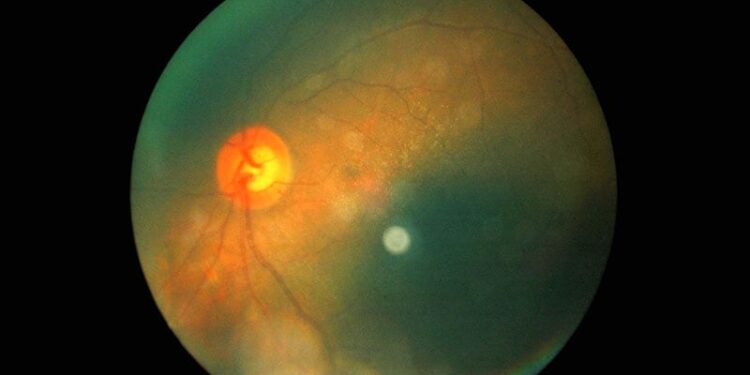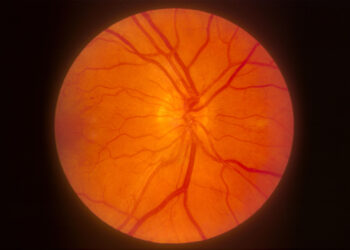For patients, a new diagnosis of diabetes can be overwhelming. It means not only managing blood sugar but also preventing serious future health complications such as diabetic retinal disease, a leading cause of vision loss when diabetes goes untreated.
Early, comprehensive eye exams are crucial for detecting subtle changes long before symptoms appear. Primary care doctors play a vital role in emphasizing the importance of these underutilized exams and ensuring patients are referred promptly — steps that can significantly impact long-term eye health and quality of life.
The Hidden Threat: Early Eye Changes in Diabetes
Type 2 diabetes often develops quietly.

“It’s a slow process — people gain weight and progress from prediabetes to diabetes,” said Thomas Gardner, MD, an ophthalmologist and diabetic retinal disease researcher at the University of Michigan, Ann Arbor, Michigan. “It’s not like breaking your arm, where you know exactly when it happens.” He noted that some patients may have had mild, undiagnosed diabetes for years before diagnosis.
This prolonged, subclinical phase can still affect the eyes: Some 7% of people with prediabetes already show signs of retinopathy. Diabetic retinal disease remains the leading cause of vision loss among working-age adults globally.
Yet vision loss is largely preventable.
“Early detection is key because it allows us to identify patients at higher risk for rapid progression of their retinopathy,” said Jennifer Sun, MD, chief of the Center for Clinical Eye Research and Trials at the Beetham Eye Institute at Joslin Diabetes Center in Boston.
Timely detection also allows clinicians to tailor monitoring and management plans, opening the door to proactive patient education aimed at preserving vision.
Practical Challenges and Risk Stratification in Screening
Current guidelines recommend a comprehensive, dilated eye exam as soon as possible after a type 2 diabetes diagnosis, given that many patients have experienced years of undiagnosed hyperglycemia, putting them at risk for retinal damage before symptoms appear. For patients with type 1 diabetes, screening should begin within 5 years of diagnosis.
Annual eye exams are crucial for monitoring disease progression, with more frequent follow-ups recommended for people with advanced retinopathy or a higher risk for complications.

“Patients can develop very advanced vision-threatening diabetic retinopathy without any symptoms at all,” said Sun. She emphasized that poor glycemic control and pregnancy are two factors that can accelerate progression and warrant closer monitoring.
Despite recommendations, fewer than half of patients with diabetes receive timely, comprehensive eye exams. “In places like the UK, national screening policies ensure everyone is screened — the government pays for it. In the US, it’s hard to get patients to see ophthalmologists for screening,” said Gardner.
Primary care physicians face competing demands in busy clinics, Gardner noted, and may not prioritize eye exams unless symptoms are present. He said patients with peripheral neuropathy or kidney disease are at significantly higher risk for diabetic retinal disease and should be prioritized for prompt ophthalmologic evaluation.
The Role of Primary Care: Early Detection, Intervention, and Communication
Regular eye exams are essential for detecting diabetic retinal disease before symptoms appear and preventing vision loss. “Early detection helps us manage diabetes to reduce the risk of retinopathy worsening,” said Sun.
Discovering early complications also drives better diabetes management. “Patients might feel fine with mildly elevated blood sugar, and physicians might be less aggressive, but if early nerve, kidney, or eye problems are found, physicians can be more proactive with medications and urging lifestyle changes,” said Gardner.
Primary care providers play an important role in discussing eye health and facilitating timely referrals. Sun recommends the DRCR Retina Network, which offers a searchable directory of clinics by state.
Thanks to large medical trials, treatment options for diabetic retinal disease are well-established. And while emerging technologies, such as smartphone-based retinal imaging and artificial intelligence, show promise, Sun cautioned that providers should assess the strength of the evidence before incorporating them into routine screening workflows.
As for communicating with patients, vision loss can be a powerful motivator. Studies show patients fear vision loss more than cancer, stroke, heart disease, or limb amputation. “We don’t want to scare our patients, but it can be a very powerful motivator to improve blood sugar control,” said Sun. “I always emphasize that the foundation of caring for your eyes is systemic control — blood sugar, blood pressure, and cholesterol.”
She encouraged providers to offer patients hope as well: Many patients maintain excellent vision for years — even decades — thanks to early detection and modern treatments. “The goal is lifelong preservation of vision without impairment from diabetes,” she said.
Source link : https://www.medscape.com/viewarticle/early-eye-exams-are-essential-new-patients-diabetes-2025a1000fzw?src=rss
Author :
Publish date : 2025-06-16 06:25:00
Copyright for syndicated content belongs to the linked Source.














